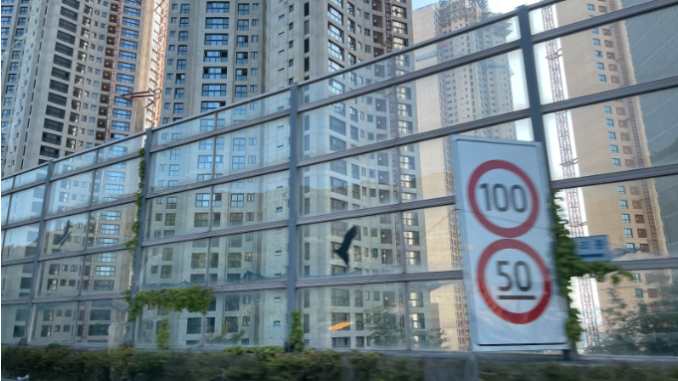
Chapter 11
(Busan, South Korea. Photo taken by author.)
“Rostovskov station, Rostovskov station,” a very bored announcer says over the intercom. “The doors open on the left. Secure all personal belongings. Glory to Otchayaniye.”
I stand and walk to the doors before the train has stopped. The woman in the nun’s habit sitting next to me has a brown paper bag on the seat next to her—I wonder what this is? Does the Rostovskov cathedral also have some vestige of a school that’s trying its best to come back?
I trot into the station. It isn’t pretty here—the simple concrete walls are covered with filth, and it looks like the bunker I once hid in. I dislike this place. When I walk out of the train station, I see a pile of books tied together with string. I remember something that I heard someone say once—“Should I perhaps peruse a thousand books to learn / that people everywhere have suffered / that now and then someone was happy?”[1]—when Pavel asked me what I liked when we first met. Now I understand why he liked to read sad things. He would have seen the world as a happy place if he read about things that are worse.
I walk up the dingy steps of the train station. There’s nothing to stop me here. Finally, I can see my friend again. The sky looks bright—I haven’t seen something so bright for years. I reach the top of the stairs and step out from the little building that guards the entry to the train station—
{The short man stood in shock as he looked at the ruined buildings. The Rostovskov cathedral had barely been finished, and even then it was reconstructed with rubble. Yellow wildflowers scattered near the foundations of swaying buildings, and there is a smell of dead fish rising in the air. The beach has been quartered off with rope and signs proclaiming danger, and there is a memorial to a different person on every corner. He wanders through these streets, looking around. His eyes that are the same color as dirty water are wandering, looking for the beautiful things once described to him. Had his hair been any longer, he would be pulling on it out of stress.}
I do not know where I am walking to—I’m not looking at any maps or street signs, I am simply walking away from the station. There are a few posters of people scattered around with flowers (plastic and real) scattered around them. I do not see Pavel’s face anywhere.
{I suppose I should have foreseen this. You see, he was not expecting his friend to be standing outside of the train station. This obviously did not happen, so he was correct in not anticipating this. I am proud of him! Our main character is intelligent enough to know not to hope for things that won’t be there. However, he was not intelligent enough to think about the aftermath of the war he lived through, what the shooting stars in the sky meant when they hit the ground. He also did not realize that the Otchayaniyan government is full of liars, for he expected it to be filled with competent people who would want to make their nation greater than it ever was. Ah, I was born in this silly little nation long ago, I did not know it would become this eventually. Yet, are not all nations comprised of imperfect humans?}
Where are all of the pretty things Pavel told me about? This place was rich, why didn’t the government try to rebuild it?
{He wanted to see a hundred little buildings built atop one another—you saw this in the postcard, so I do not need to describe it. However, that picture was taken before the war. Now he saw a hundred little buildings made of mud tied together by a dear mother’s wish for her son to return—did you expect anything else, my dear? Dreams mean nothing, yet they are so sweet! My dear, had this world been different, I would show you what mine once were, yet now I have been imprisoned in this man’s soul—no, not his soul! Someone else’s. Ah, I am getting off-topic! Why didn’t you tell me to get back to the explanation? I know you want it—though you must be intrigued by the actor waltzing on stage near the end of the story, you’re probably more invested in the person the story is about.}
{The young man stumbles across the ruins of what was once a large house—though explosives destroyed it.. The weapon known as time destroys all eventually, and it was certainly not kind to this place. I wish it would have spared this place and destroyed me, a pathetic actor who believes he is the screenwriter. Our dear main character looks at the name written on the door.}
I stumble across a big house with a sign with the name Matryona Alexandrevna Dimitrova on the gate.
Is this the house of Pavel’s aunt? He told me that she was a good person, that he’d introduce me to her someday. Maybe she can tell me where he is.
I’m depending on it. Maybe Pavel has stepped out for an errand. Maybe he’ll be back.
I knock on the door. I hear some movement from inside, but nobody answers.
I knock again. There is more movement, but nobody answers.
I knock again. There is no more movement.
[1] Johann Wolfgang von Goethe, Faust
